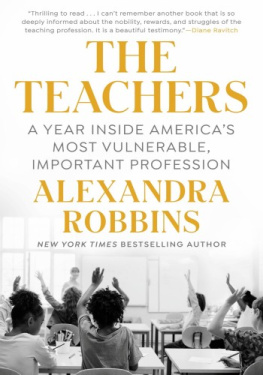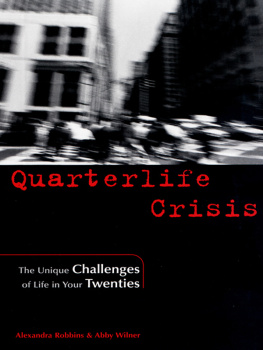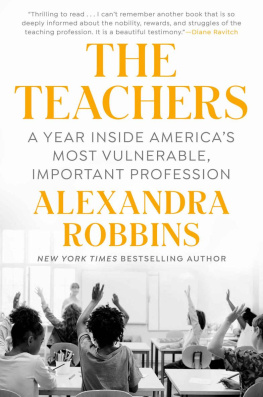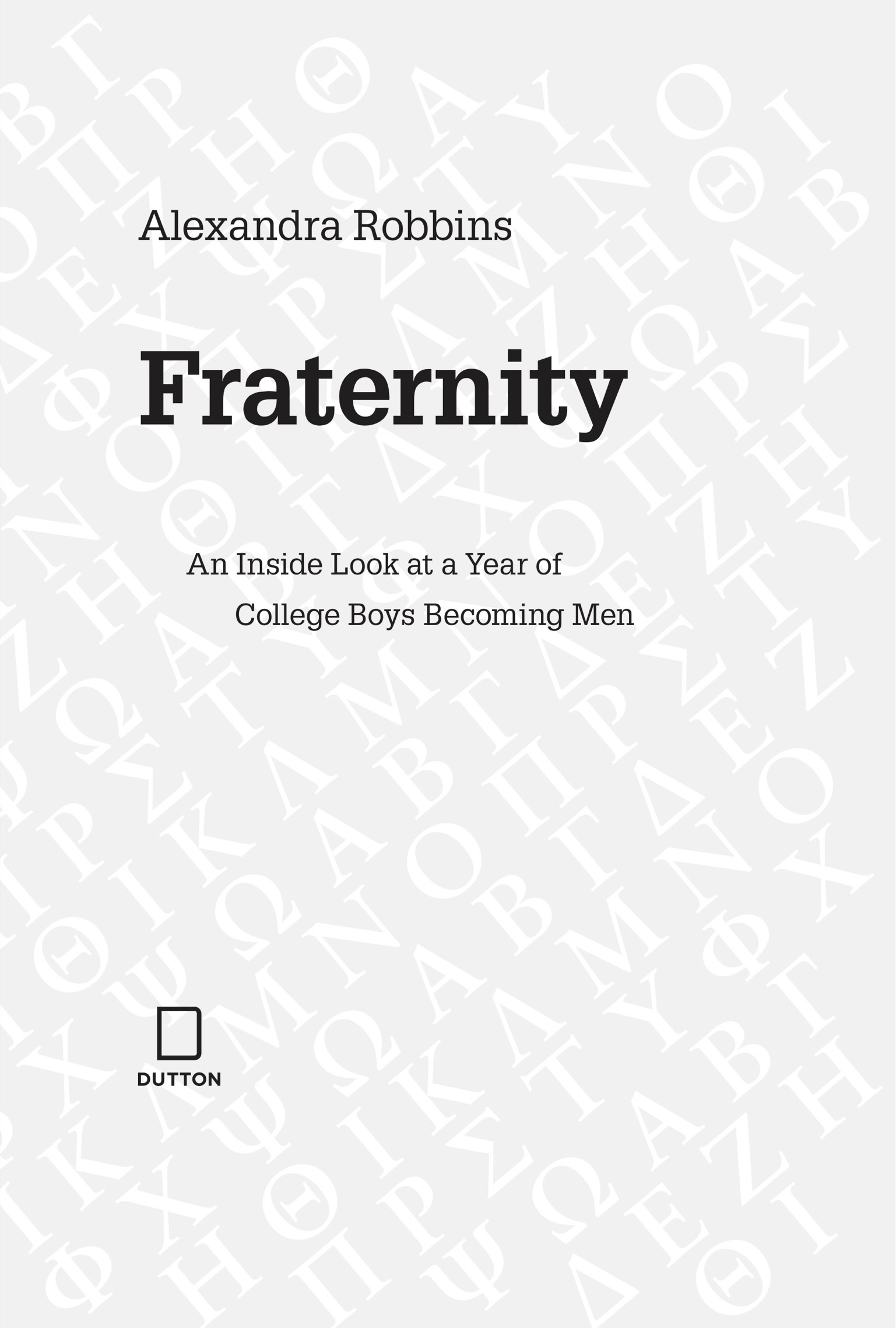ALSO BY ALEXANDRA ROBBINS
The Nurses: A Year of Secrets, Drama, and Miracles with the Heroes of the Hospital
Secrets of the Tomb: Skull and Bones, the Ivy League, and the Hidden Paths of Power
Pledged: The Secret Life of Sororities
The Overachievers: The Secret Lives of Driven Kids
The Geeks Shall Inherit the Earth: Popularity, Quirk Theory, and Why Outsiders Thrive After High School
Conquering Your Quarterlife Crisis: Advice from Twentysomethings Who Have Been There and Survived

An imprint of Penguin Random House LLC
penguinrandomhouse.com

Copyright 2019 by Alexandra Robbins
Penguin supports copyright. Copyright fuels creativity, encourages diverse voices, promotes free speech, and creates a vibrant culture. Thank you for buying an authorized edition of this book and for complying with copyright laws by not reproducing, scanning, or distributing any part of it in any form without permission. You are supporting writers and allowing Penguin to continue to publish books for every reader.
DUTTON and the D colophon are registered trademarks of Penguin Random House LLC.
LIBRARY OF CONGRESS CATALOGING-IN -PUBLICATION DATA
Names: Robbins, Alexandra, 1976 author.
Title: Fraternity: an inside look at a year of college boys becoming men / Alexandra Robbins.
Description: New York, New York: Dutton, [2019] | Includes bibliographical references.
Identifiers: LCCN 2018027905 (print) | LCCN 2018032943 (ebook) | ISBN 9781101986738 (ebook) | ISBN 9781101986721 (hc: alk. paper)
Subjects: LCSH: Greek letter societiesUnited States. | College fraternity membersUnited States. | Male college studentsUnited StatesConduct of life.
Classification: LCC LJ34 (ebook) | LCC LJ34 .R55 2019 (print) | DDC 371.8/55dc23
LC record available at https://lccn.loc.gov/2018027905
While the author has made every effort to provide accurate telephone numbers, Internet addresses, and other contact information at the time of publication, neither the publisher nor the author assumes any responsibility for errors or for changes that occur after publication. Further, the publisher does not have any control over and does not assume any responsibility for author or third-party websites or their content.
Version_1
To my family, past and present, with love
C ONTENTS
Preface
I N THE YEARS since I wrote Pledged: The Secret Life of Sororities, which remains the most widely read of my books, I have spoken to thousands of fraternity and sorority members. As I became a go-to media pundit on Greek life, TV viewers and audience members at my high school and college talks often asked me about fraternities, which prompted me to return to this world. This book, however, is not Pledged. The surprise for readers of Pledged, in those years before universal social media, was that sororities, then viewed as bastions of pearls and purity, were not all good. Perhaps a surprise for the public in this book, then, is that fraternities are not all bad.
To find out what its really like to be a fraternity brother in the twenty-first century, I contacted hundreds of current and recent brothers whose fraternity chapters didnt make headlines. Brothers who made me question whether the media had turned the system into a caricatureand who made the case that many fraternities can actually be safe spaces for men who fear they attend a school where guys cannot be themselves, will not easily find friends, or would otherwise slip, lost and invisible, through the cracks.
Readers might naturally wonder from the outset whether this book is pro- or anti-fraternity. The shortest answer is that this book is pro-students and the people who care about them. While fraternities are often either celebrated or demonized, the truth is much more complicated. Many fraternity chapters do what youd want them to do: offer support, guidance, friendships, and training to young men who have never lived away from home. But others encourage the worst in the same demographic, too often with tragic or disturbing consequences. This book explains why and how this happens during an era in which the state of Americas young men, and their interpretations of masculinity, concern us all.
To better portray fraternity perspectives, and to make this book more entertaining to read, I closely followed the stories of two real-life college boys for approximately one year. I chose Jake, a freshman searching for brotherhood, and Oliver, a sophomore striving for leadership skills, because they represented students missing from the media and contemporary literature: smart, good-hearted, self-aware, earnest fraternity members whom readers would root for. While I intended to capture undeniably positive experiences, both stories took surprising turnsand one had a stunning outcome that I could never have foreseen.
In the essay sections, readers will also meet Kirk, a transfer student who experiences his fraternity through two distinctively different chapters; Ben, who as a junior founded a South Carolina chapter of a national fraternity; Teddy, a working-class Oregon brother whose chapter is his family away from home; and several other fraternity members who want readers to understand the truth of their experiences. Many of these brothers are former AP students or engineers, rather than the lunkheads depicted in fraternity movies. Some of them are the kinds of guys who mentioned to me without prompting that they are feminists. While I prioritized interviews with active and recent brothers because this is a book about current college life, I occasionally include the perspectives of alumni acting as advisors because their views reflect Greek experiences outside the bubble of a single chapter. The variety of stories provides a fresh look at issues that concern boys and their parents: seeking friendships and navigating identity, sex, social media, peer pressure, alcohol use, gender roles, social development, and even porn.
This book is about the alternately fraught and rewarding transitions from high school to college and boyhood to manhood. Fraternity includes the stories and explanations that both reveal to college guys and soon-to-be college guys the reasons behind their impulses toward certain behaviors and help their classmates, parents, educators, and sorority counterparts to consider the boys perspectives. One of my intentions is to provide parents and students with a starting point for discussions so they can openly communicate about the meanings and pressures of masculinity, and about whether to join the Greek system or how to manage the culture. Readers of my previous books have said that by talking about the characters rather than themselves, students and parents have been able to have more open, in-depth conversations about school. Non-Greeks also will find much to learn, as I did, about what its like to be a college guy today.
Someone must advocate for the boys who arent causing trouble and for the parents who want to help and understand them. Someone must give them an opportunity to tell their stories in their own words. Todays young men are coming of age at a time when we are renegotiating what it means to be a man, which presents new challenges, reopens old wounds, and creates additional reasons for students to seek out brotherhood. Its imperative that we attempt to comprehend and alleviate the pressures faced by teenage boys in twenty-first-century Americaand acknowledge that even fraternity brothers struggle with them, too.


















